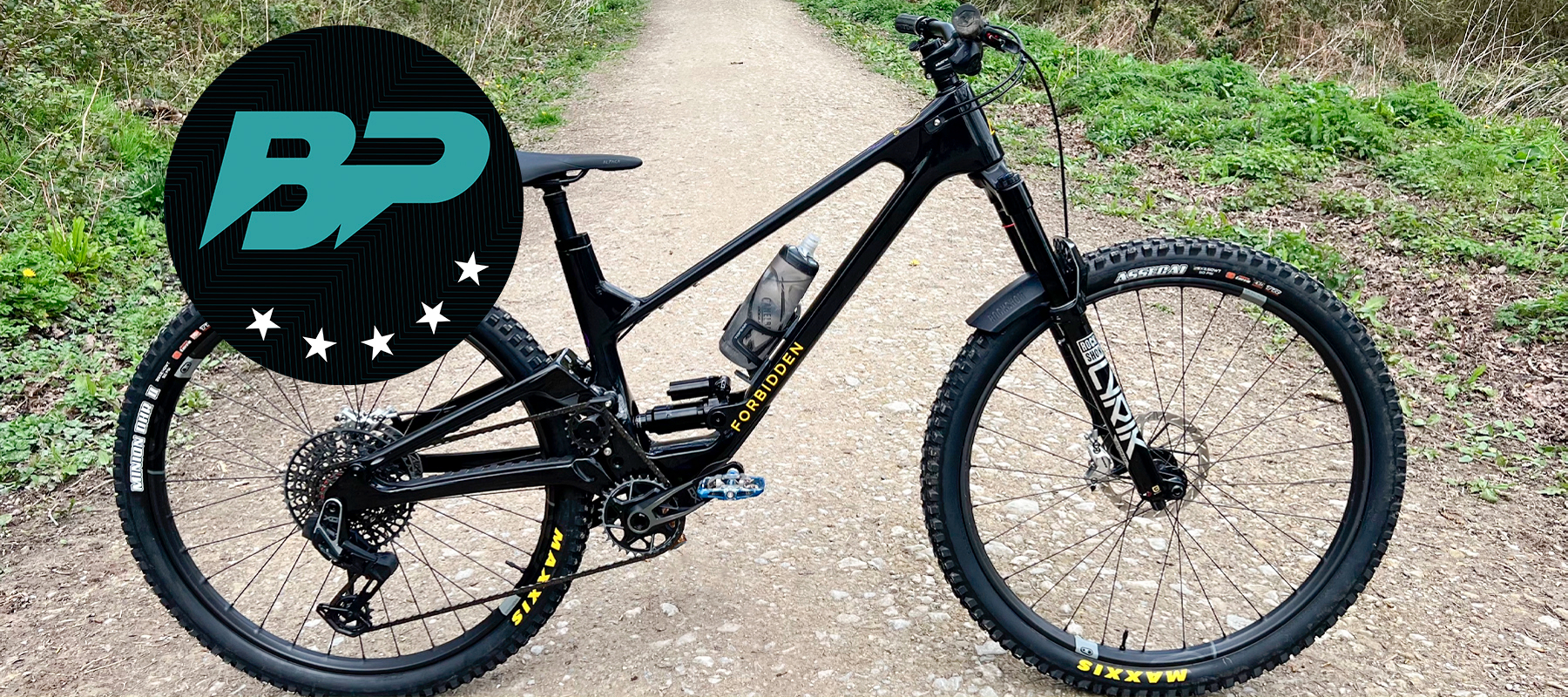Bike Perfect Verdict
Forbidden's Druid V2 delivers an even more mind bending 'best of short travel and long travel' feel with less drag, better security, neat detail tweaks and less weirdness at extremes to create a uniquely compelling trail charger.
Pros
- +
Superb ‘best of both worlds’ performance
- +
Updated proportional geometry
- +
Less chain drag and better security
- +
Internal storage
- +
Doesn’t feel weird or ‘stretchy’ deeper in travel
Cons
- -
Heavier than conventional 130mm bike
- -
Still some chain grumble
- -
MX means swapping chain stays not just the linkage
Why trust BikePerfect
Forbidden’s original Druid kickstarted the high pivot revolution for many people and the latest V2 incarnation stirs the cauldron and shifts up a gear to make it one of the best trail bikes I’ve ridden. Despite a ton of detail and tech behind the evolution, it’s easier to ride too.
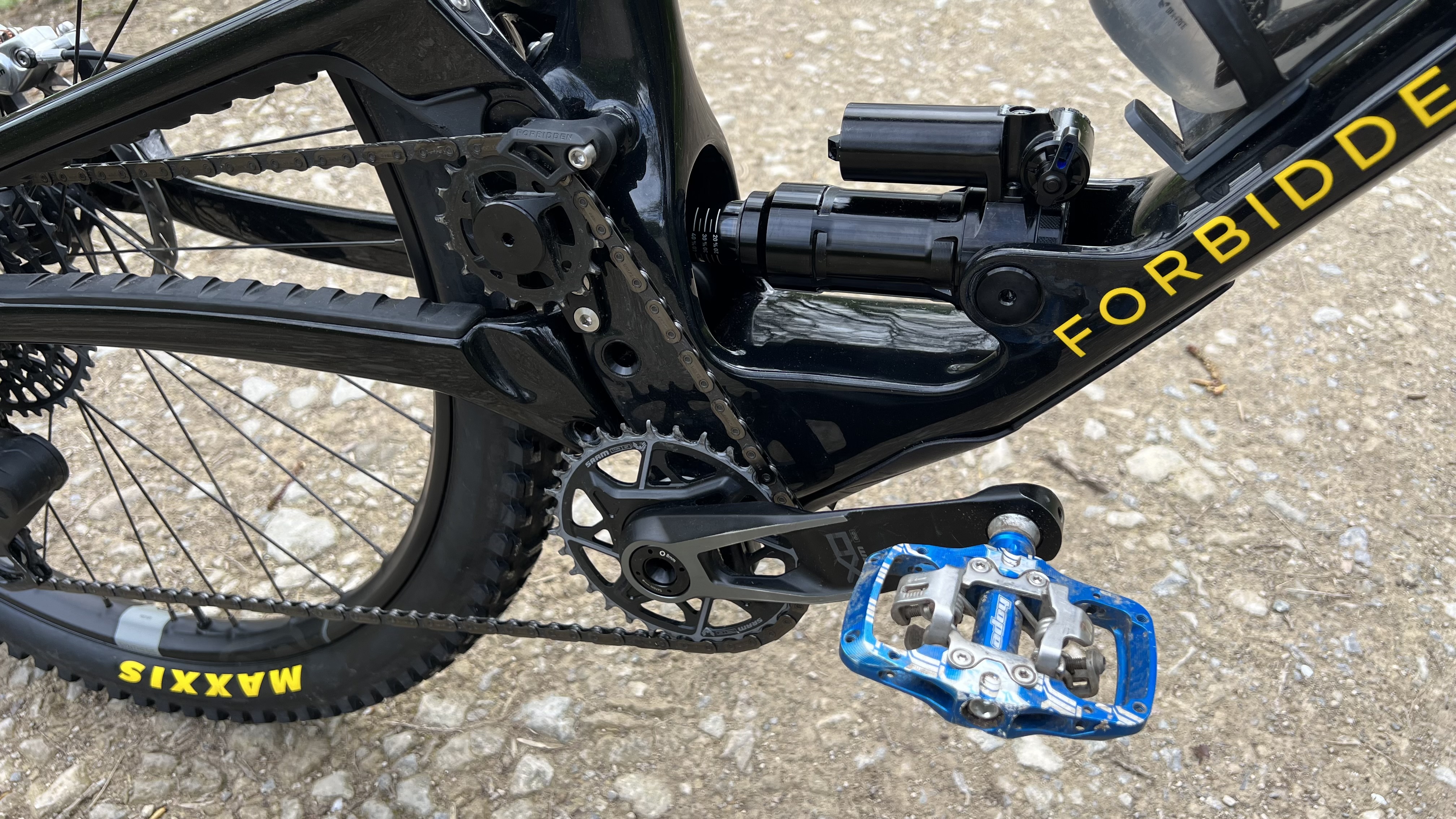
Design and geometry
The Druid V2 frameset ($3,799 / £3,599 / €3,999) is a complete ground up reworking. Shallower main tubes include a super steep top tube that aligns perfectly with the upper rear stays, while the lower stays line up with the deeper belly for a chassis that looks super rapid before it even starts moving. The deeper belly also includes a bottom entry storage hold for a tube and trail tool, while there’s an accessory mount under the top tube and space for a full size bottle in the frame. Extensive rubber wrapping protect from roost and chain slap, and the internal control routing is clamped for ambidextrous security and zero internal chafing. Lower linkage bearings are now serviceable collet style (they can be easily adjusted to take out any slack) and all sit in the lower link rather than the frame itself for more manageable maintenance.
Reaches grow by 15mm (440 – 500mm across the new S1 to S4 sizing), head angle slackens by a degree to 65 while seat tubes steepen by 1.5-degree (77 effective on the S3 I tested). Running 27.5in rear wheel now requires a different chainstay not just a different linkage but slackens angles by half a degree and takes 5mm off the reach. On the subject of chainstays, Forbidden still use properly proportional geometry with a radical 423 – 466mm spread of rear center measurements.
The back end sees big changes to the ‘Trifecta’ suspension system. It’s still a high pivot setup, but the idler wheel is a bigger 18T steel piece running on a 100 percent fill submarine bearing which is packed with solid grease. It’s also fixed onto the mainframe, not the swingarm, with a reversible mount mimicking 52 or 55mm chain lines. Improved chain wrap and fixed relationship between idler and chainset removes the need for a lower chain guide, but there’s still a neat chain guide on the idler. All frame sizes now use a single chain rather than needing extra links.
Rather than a single piece subframe, there’s now a rear pivot on the ‘seatstay’ creating what Forbidden call an “Inverted 4-bar” suspension system that allows them to change shock ratio and axle paths through the 130mm of rear wheel travel. That’s controlled by a 50mm stroke RockShox Super Deluxe Ultimate shock with a top trunnion mount and production bikes will have a bearing not bushes at the base too.
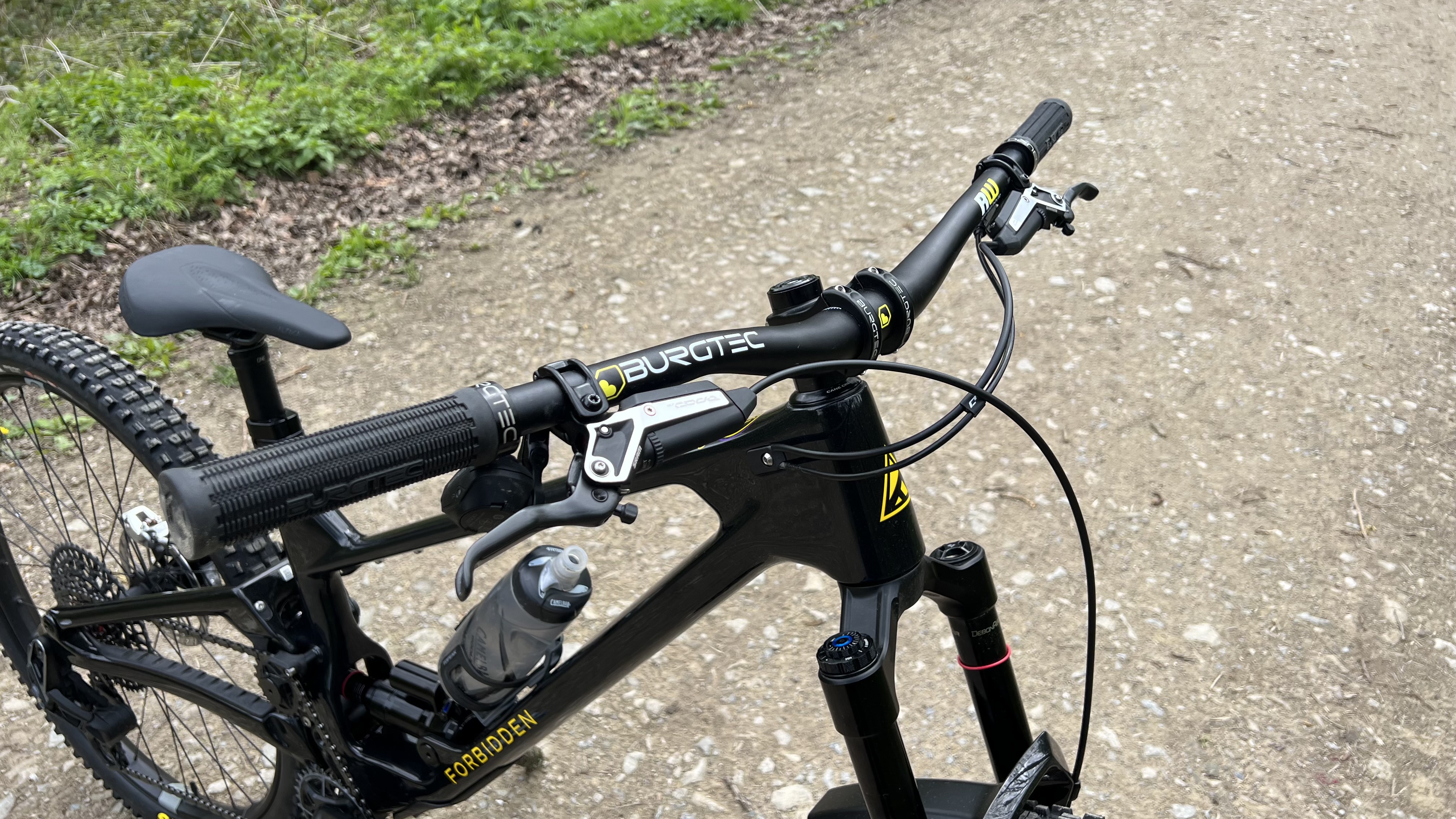
Components and build
The new Druid launches in a single SRAM XO T-Type AXS Eagle Transmission option at a well priced $8,899 / £8,999 / €10,599, but will be joined by two GX AXS options (£7,299 and £6,299) shortly. The flagship has some real highlights too, including the new top tier SRAM Code Stealth Ultimate brakes, ground hugging Crankbrothers Synthesis Enduro Carbon wheels, EXO and EXO+ Maxxis Assegai and DHR tires, Burgtec cockpit with size specific bars and OneUp dropper post. A 150mm RockShox Lyrik Ultimate fork matches the RockShox damper out back, finishing a 14.77kg package for an S4 size without pedals.
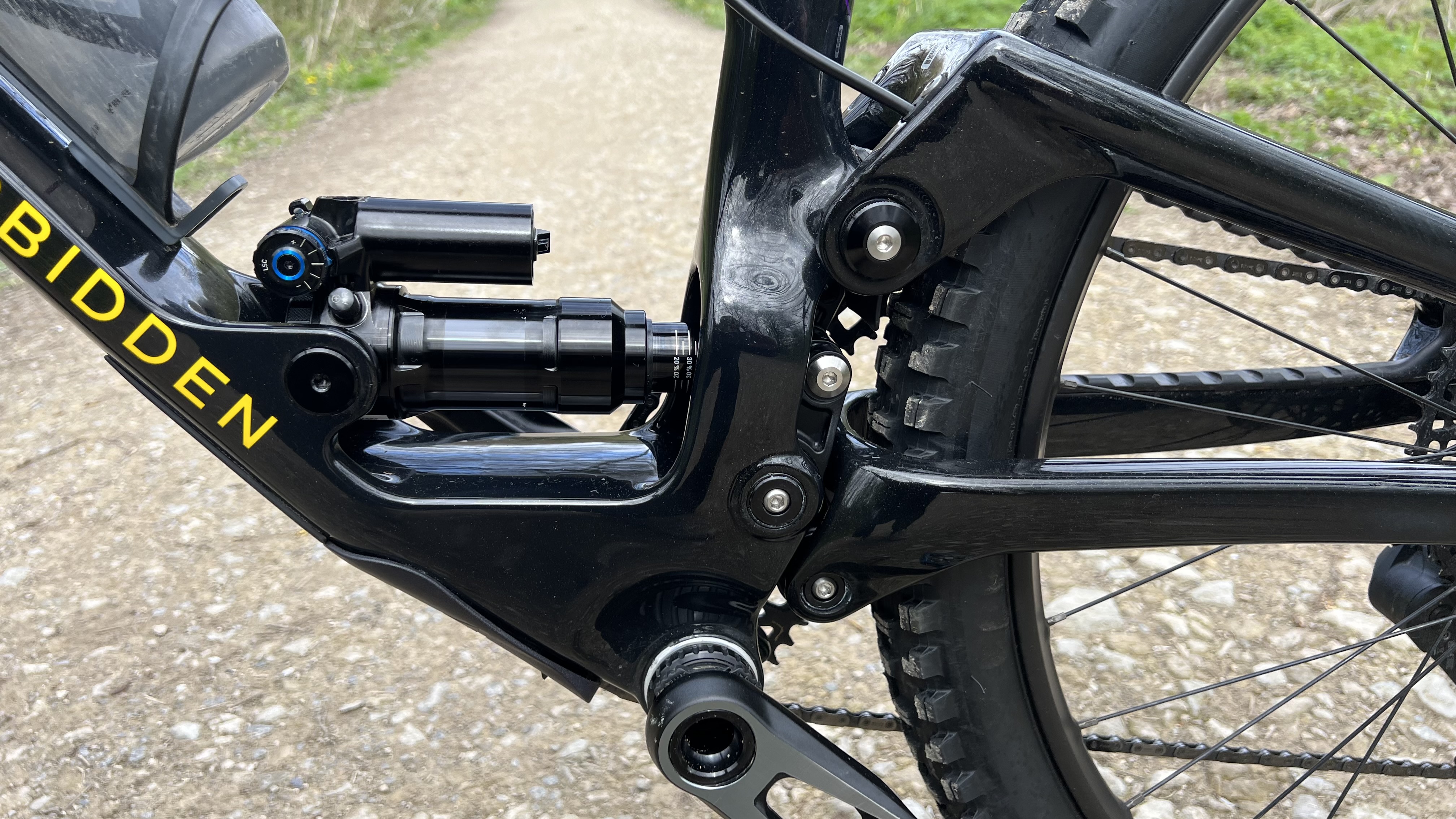
Ride, handling and performance
While on paper the Druid V2 looks excellent for hard trail/enduro riding, where it will really grab your attention is on the trail. That’s because Forbidden have taken it’s ‘best of both worlds’ short / long travel vibe and amped it up even more.
The rear wheel is still moving significantly backwards for nearly all it’s travel, which allows it to suck up speed killing slap impacts far better than a more vertical axle path. Running the chain over the idler means minimal pull back through the pedals though so you can keep hard on the gas even across rocks, roots and stutter bumps that would normally choke momentum and blow your feet off the pedals. The ‘Inverted 4-bar’ design has allowed Forbidden to drop off both anti-squat and anti-rise ratios off as you go deeper into the stroke too. That further reduces the effect of pedaling and more importantly braking when you’re really driving the bike hard. That means none of the ‘stretchy splay’ feel from the back end that could feel weird and hard to predict at first on the previous Druid. Add a more pronounced change in shock ratio and hydraulic bottom out in the damper and you’re getting a bike that supports better and stays much more predictable in the mid-stroke and doesn’t feel like you’ve left the rear wheel behind if you really splat a landing or hit multiple Gs through a turn. That makes the whole bike easier to learn (once you’ve got used to how fast it carries through previous choke sections) and the 150mm fork feels just right – rather than undergunned – out front.
Longer reach also adds the stability that the original Druid missed in sketchier moments, but they’ve not slackened out the head angle so much that it’s lost the agile and responsive handling that made it such an involving, exciting ride. In fact, the tighter, brake and pedal jack isolated rear end makes it even more responsive and ready to kick and launch out of corners or send hips and kickers like a true short travel bike. And before you ask, yes it manuals and lifts the nose just fine.
While the suspension unsurprisingly dominates conversation and character, the remodeled frame doesn’t just look superb, it’s got a great balance of flow and precision that really rewards hard riding with extra grip and that hard to quantify ‘life’ that can take a bike from sorted to truly special. Burgtec bars and the more compliant, shallower/reduced spoke front wheel and benchmark Maxxis Assegai tire add more traction to the front end too and this sample of the Lyrik fork was nothing but a silently assured assassin in terms of killing doubts over control, however fast and loose I got.
Even running the recommended 30-35 percent sag, the Druid V2 is super positive and grippy under power too and while there was some rumble from the idler on my test bike, removing the lower guide has dramatically reduced chain drag. The way the suspension can roll up and over steps and stutters without disturbing pedal rhythm combines with the steeper seat angle to make it an outstanding technical climber too. It’s efficiently stable in or out of the saddle on extended climbs too although the extra weight and psychosomatic grumble of the Trifecta system mean purist pedallers should probably still stick to a lighter, more conventional bike.
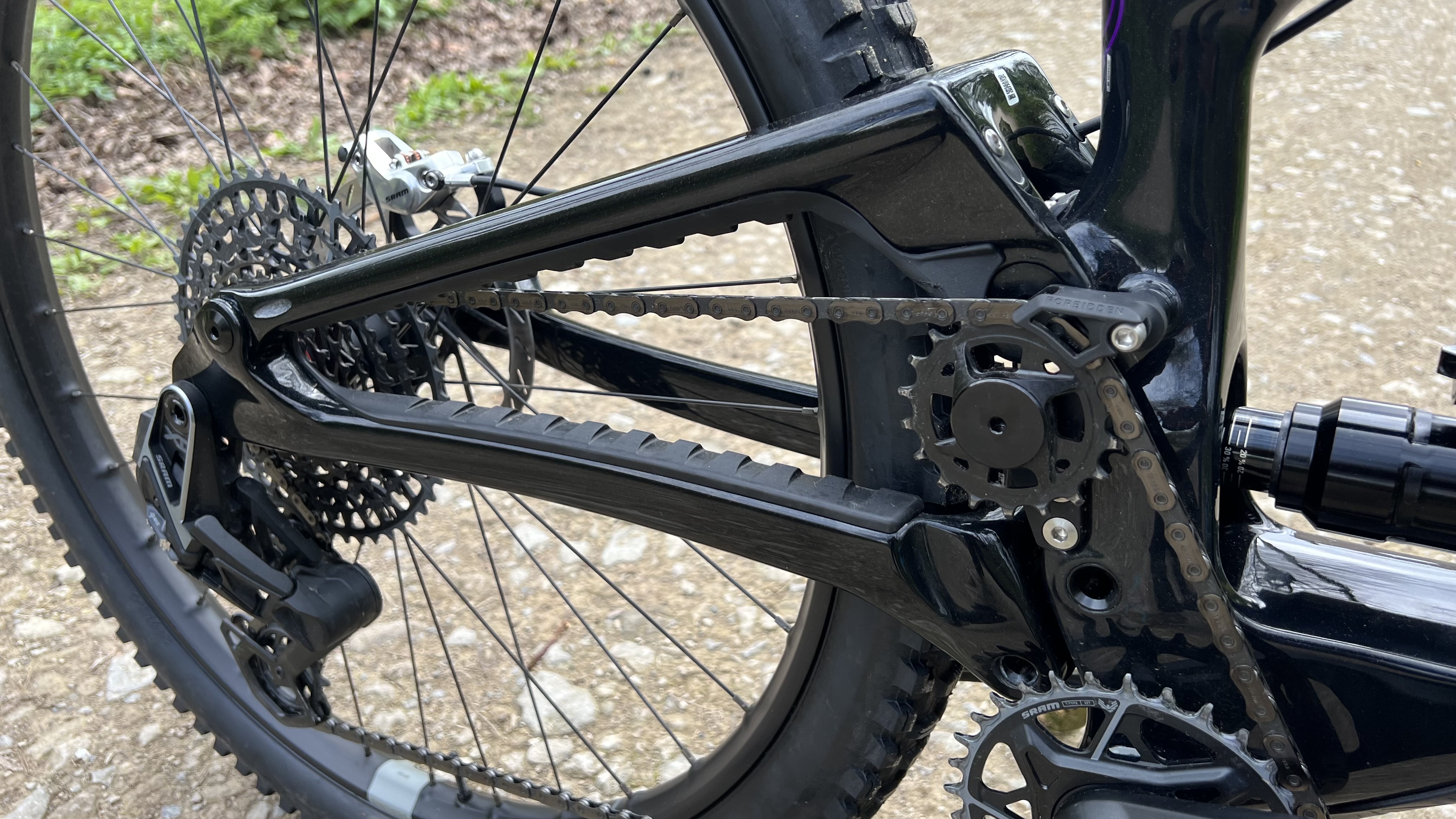
Verdict
I’ve dropped in the phrase ‘best of both worlds’ several times in this test, but that’s genuinely what the Forbidden Druid V2 feels like. It charges, pops and hustles like a hard pedaling short travel bike but carries speed through jank and jolt sections like the Trifecta system is some kind of catapult. When that generates more speed than you’re expecting (which will happen a lot at first) it’ll save your stupid ass/arse and throw you straight back into the ring on your toes and ready to go. It does it without any of the old stretchy weirdness either, so not only is the overall performance better it’s easier to go harder on sooner.
Add up to date, suspension flattering geometry, less drag, internal storage, smarter servicing touches and a killer spec right down to the correct tire carcasses at each end and the Druid is truly something special. In fact, when I’m increasingly saying test bikes are sorted, capable and forgiving but in many ways increasingly similar, the Forbidden has got just enough freak to make it one of the bikes I’ve enjoyed riding most and been gutted to hand back in years.
Test conditions
- Trails: Steep, fast, natural DH and tech singletrack with berms, boosters and drops
- Surface: Loam, roots, rocks, grass, gravel
- Weather: Cold but bright
Tech specs: Forbidden Druid V2 XO
- Discipline: Trail/enduro
- Price: $8,899 / £8,999 / €10,599
- Weight: 14.77kg (size S3 tested)
- Head angle: 65 degrees
- Frame material: Carbon fiber
- Fork: RockShox Lyrik Ultimate, 150mm travel
- Shock: RockShox Super Deluxe Ultimate 130mm travel
- Sizes: S1, 2, 3 (tested), 4
- Weight: 14.77kg
- Wheel size: 29in
- Chainset: SRAM XO T-Type 32T, 165mm arm crank with Dub bottom bracket and 18T steel idler
- Mech: SRAM XO T- Type AXS 12-speed
- Shifter: SRAM XO T- Type AXS 12-speed
- Cassette: SRAM XO T- Type 12-speed 10-51T
- Brakes: SRAM Code Stealth Ultimate with 180mm HS2 rotors
- Tires: Maxxis Assegai MaxTerra 3C EXO 29x2.5in front and Maxxis DHR MaxTerra 3C EXO+ 29x2.4in rear
- Wheels: Crank Brothers Synthesis Enduro Carbon
- Bar: Burgtec Ride Wide Alloy 780mm
- Grips: Burgtec Bartender Pro
- Stem: Burgtec MK3 Enduro 42.5mm
- Seatpost: OneUp170mm dropper
- Saddle: Fizik Terra Alpaca X5
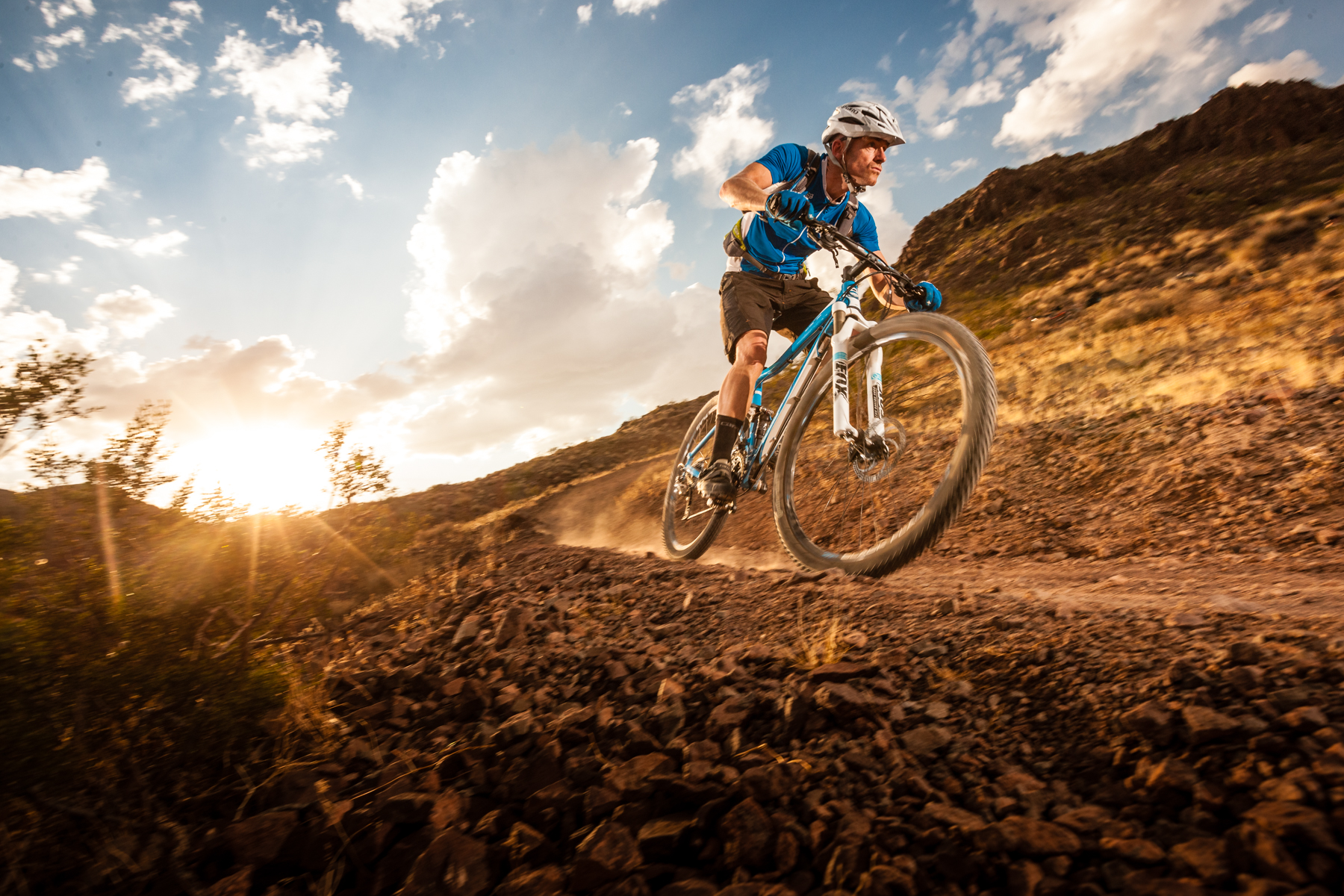
Guy Kesteven has been working on Bike Perfect since its launch in 2019. He started writing and testing for bike mags in 1996. Since then he’s written several million words about several thousand test bikes and a ridiculous amount of riding gear. He’s also penned a handful of bike-related books and he reviews MTBs over on YouTube.
Current rides: Cervelo ZFS-5, Specialized Chisel, custom Nicolai enduro tandem, Landescape/Swallow custom gravel tandem
Height: 180cm
Weight: 69kg
